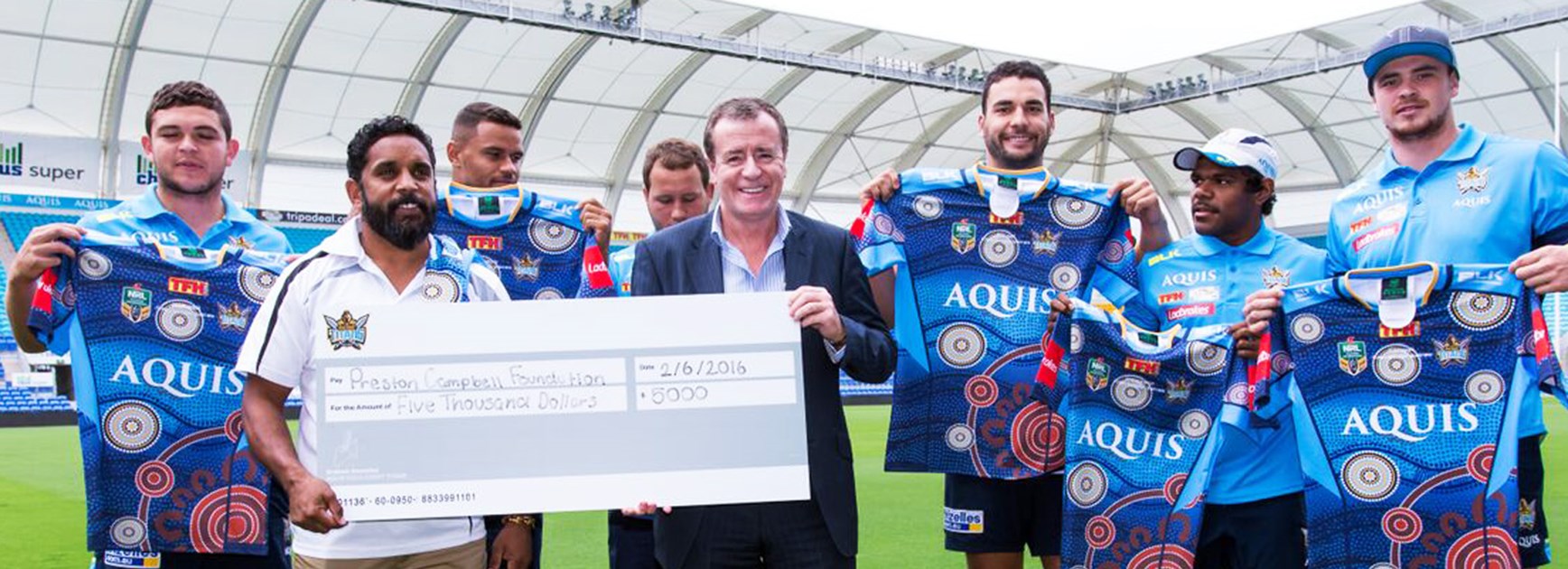
He became synonymous with the Titans in their formative years but Preston Campbell admits it was that deep-seated connection to the club that led to the agonising decision to not attend any games as he struggled to come to terms with life after football.
In Round 10 as the NRL celebrated Indigenous Round there was a celebration of a different kind in the corporate suites at Cbus Super Stadium as Campbell broke a five-year self-imposed game-day ban to meet up with former Titans teammates and watch the team in action.
The special Indigenous Round jerseys that the Titans wore that night against the Roosters were auctioned off after the game with $5,000 going to the Preston Campbell Foundation and a further $5,000 to be donated to the Deadly Choices program.
After retiring following the 2011 season Campbell became the face of the now defunct Titans 4 Tomorrow program but has continued his community work since it was closed down, launching the Preston Campbell Foundation late last year.
Campbell, who has also become a vocal mental health advocate after revealing his own battles with depression during his playing days, told NRL.com that in order to forge a new life after football he had to cut himself off from the game altogether.
"Like a lot of fellas I struggled when I first left and I just needed to get away from it," Campbell said.
"I saw a lot of blokes that once they retired they struggled a lot. They tried to stay in contact with the game and involved somehow but it wasn't viable for them.
"I wanted to forge my own something different outside of footy because it was such a big part of my life. I learnt so much from it and it doesn't owe me anything but I needed to get away and start a new life and the only way I could do that was to get completely away from it.
"There were times where I looked at the footy or saw something around football and I wondered whether I'd made the right decision and even at times regretted my decision but I knew if I got away and dug myself in to the work I love doing, community work, eventually that feeling would go away.
"There's still a bit of fire there but it's not as bad as it used to be. I can turn up to a game now without wanting to run out onto the field and regretting my decision, and I think that's normal for a lot of people."
Two years ago Campbell took a presentation titled 'Players' State of Mind' to all 16 NRL clubs where he shared his own personal battle including the confronting admission that months after being named the 2001 Dally M Medal winner that he attempted to take his own life.
The NRL's State of Mind campaign has since expanded to include ambassadors at each of the 16 NRL clubs as well as Jillaroos captain Ruan Sims and Samathan Hopkin from Touch Football Australia.
During Origin camp last week players such as Darius Boyd, Michael Morgan and Dane Gagai spoke openly about how mental health issues have affected them personally and Campbell says it is this openness that will have the greatest impact in society.
"Rugby league has a power of influence and the more great messages they put across the more difference they're going to make in community," Campbell said.
"The mere fact that they're talking about it, it institutes a ripple effect. The more people that talk about it the less of a stigma so I'm proud of the boys that have come out and shared their stories because the more we talk about it in the footy environment the more people it will help outside.
"This epidemic of mental health, it's winning at the moment so the more people can come out and talk about it and the more big organisations like the NRL can put towards it we'll start to bring that back."
For more information on the NRL's State of Mind campaign visit www.stateofmind.com.au.

